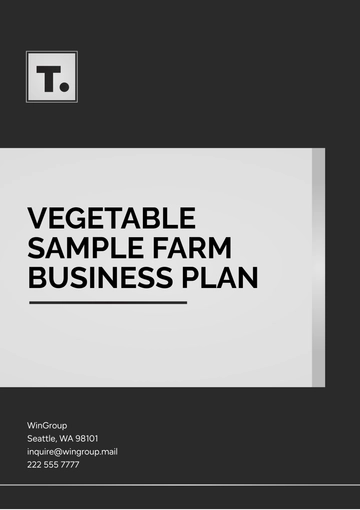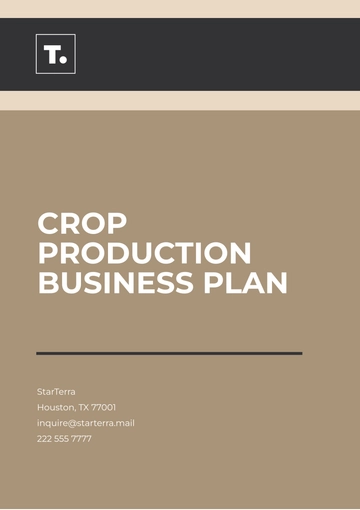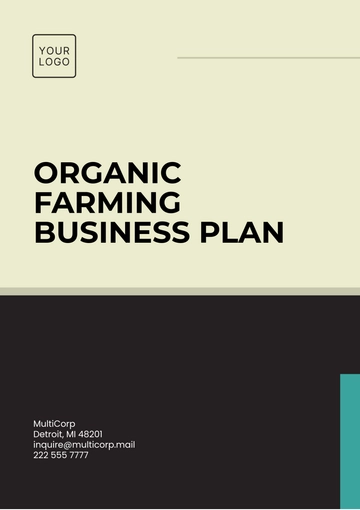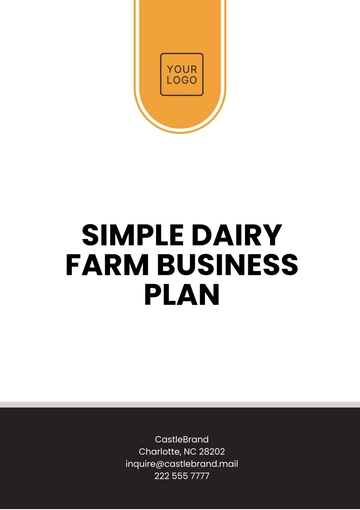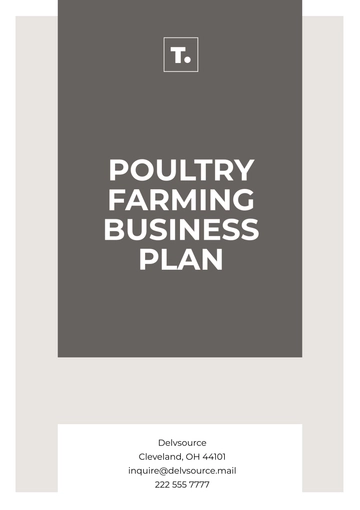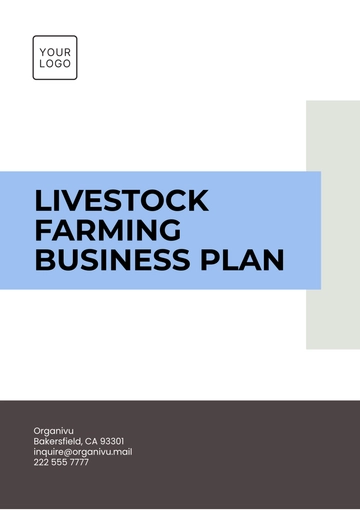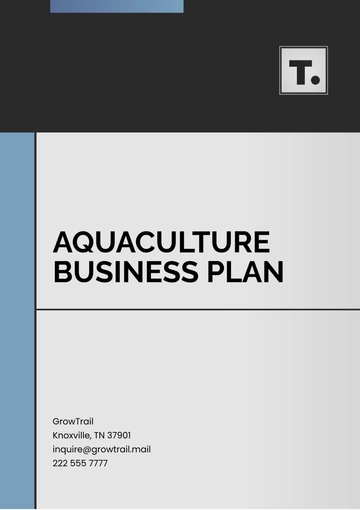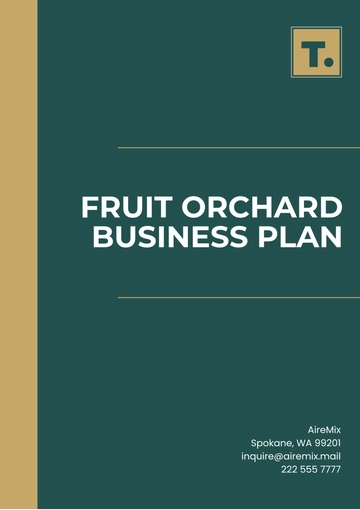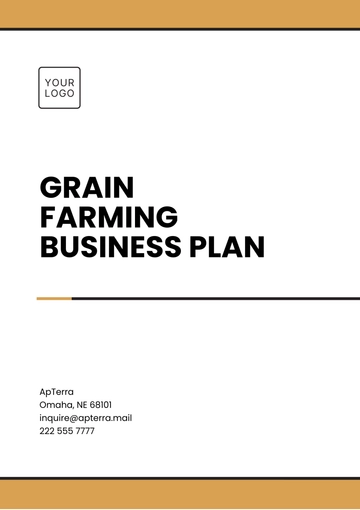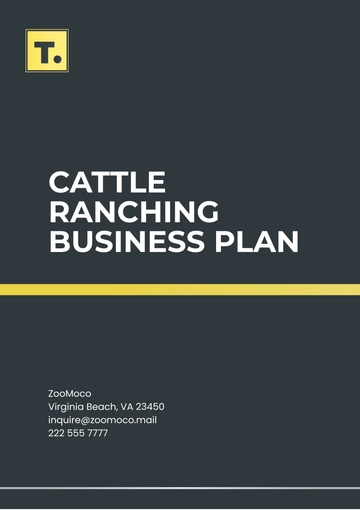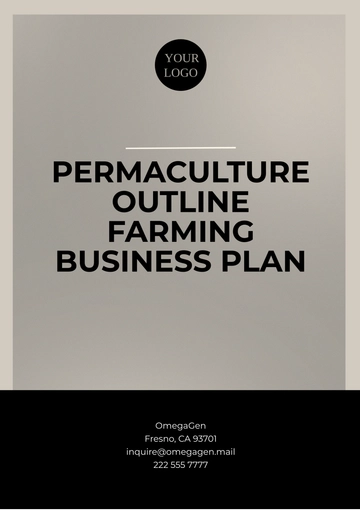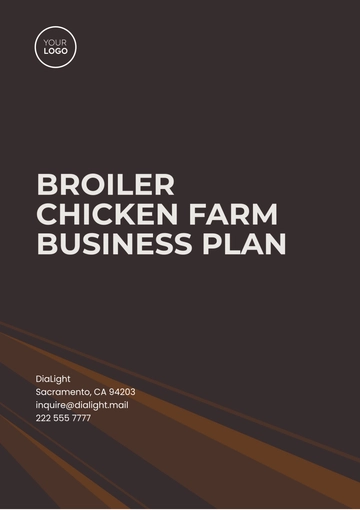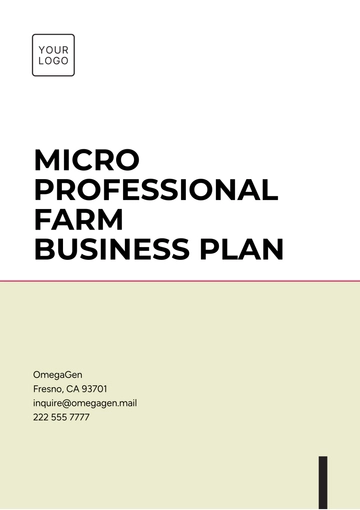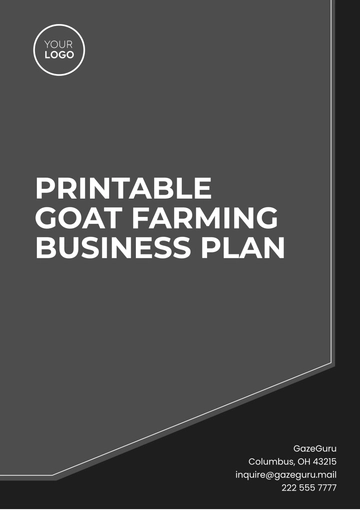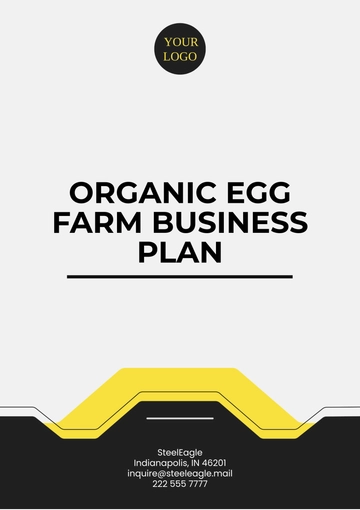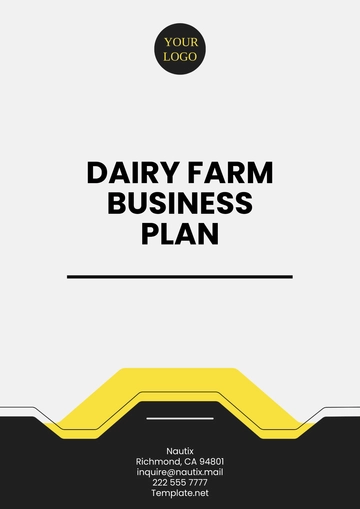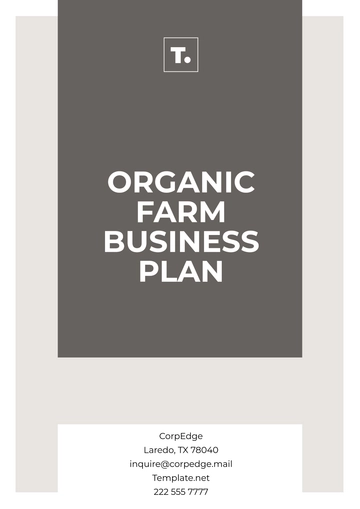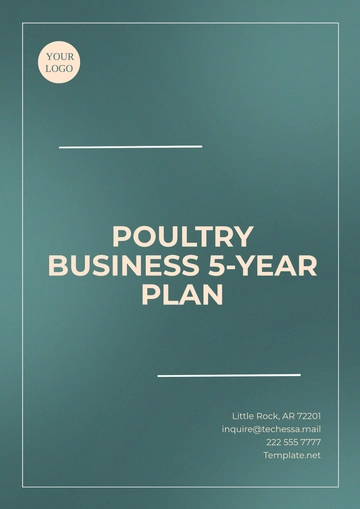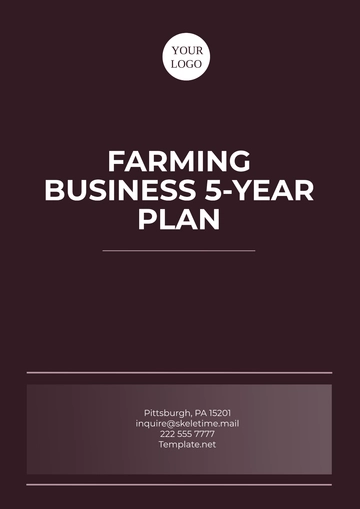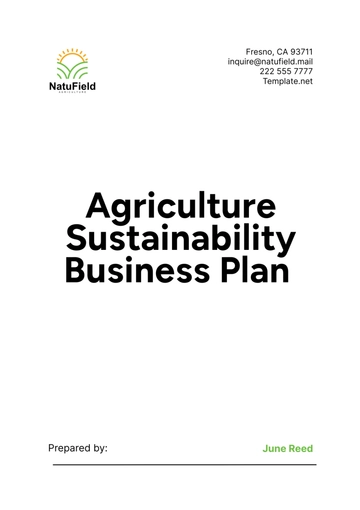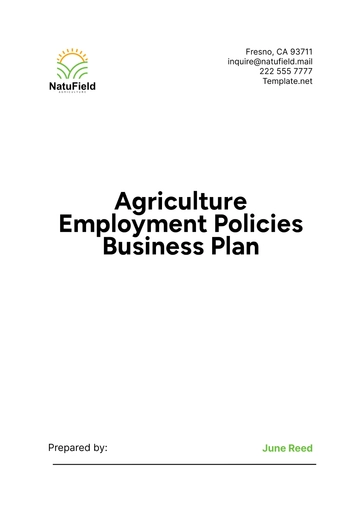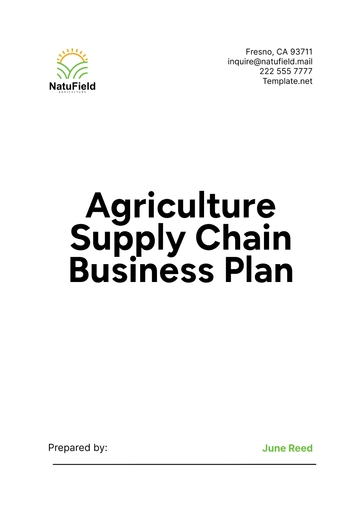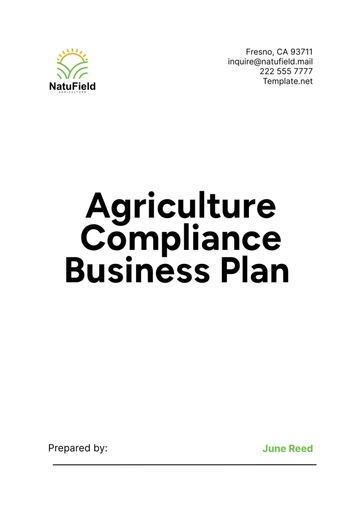Free Agriculture Business Plan

I. Executive Summary

[YOUR COMPANY NAME] is dedicated to sustainable farming practices that prioritize environmental stewardship while delivering high-quality agricultural products. Our mission is to provide fresh, organic produce to local communities while promoting eco-friendly farming techniques. Key financial highlights include an initial investment of $500,000, projected revenue growth of 20% annually, and a commitment to achieving profitability within the first three years. Plans include expanding product offerings and implementing precision agriculture technologies.
II. Company Description
[YOUR COMPANY NAME] is a family-owned farm specializing in organic vegetable production. Our business operates in the crop production sector, focusing on sustainable farming methods to meet the growing demand for organic produce. We aim to satisfy market needs for healthy, locally sourced food while minimizing environmental impact through responsible agricultural practices.
III. Market Analysis
Target Market: Health-conscious consumers increasingly opt for healthier foods, prompting local eateries and supermarkets to meet demand by offering quality, organic ingredients.
Industry Analysis: There is a growing trend toward adopting organic and sustainable farming practices; however, this shift poses several challenges, including the variability of weather conditions and the intense competition in the market.
Competitive Analysis: Competitors include other local organic farms and larger commercial suppliers. Our competitive advantages lie in our commitment to sustainability, freshness, and direct local distribution.
IV. Organizational Structure
Management Team:
CEO/Owner: John Smith
Operations Manager: Sarah Johnson
Sales and Marketing Manager: David Lee
Employees: Farmworkers, administrative staff, and sales/distribution team.
Legal Structure: GreenFields Agriculture Ltd. is registered as a limited liability corporation (LLC) in the state of [Your State].
V. Products/Services
Organic Vegetable Boxes

Description: [YOUR COMPANY NAME]offers seasonal assortments of organic vegetables carefully selected and packed into convenient boxes. Each box contains a variety of fresh vegetables harvested at their peak ripeness, ensuring optimal flavor and nutritional value.
Advantages:
Freshness: Vegetables are harvested just before delivery to ensure maximum freshness and flavor.
Locally Sourced: Produce is sourced directly from our farm, promoting local agriculture and reducing carbon footprint.
Organic Certification: All vegetables are certified organic, free from synthetic pesticides and fertilizers, meeting the high standards of organic farming practices.
Pricing: [YOUR COMPANY NAME] operates on a subscription-based model, offering vegetable boxes for $30 per box. Subscribers receive regular deliveries based on seasonal availability.
Target Market: Our target market includes health-conscious consumers who prioritize fresh, organic produce for their dietary needs and local restaurants seeking high-quality ingredients for their culinary creations.
Specialty Herbs

Description: [YOUR COMPANY NAME] specializes in growing a variety of fresh, organically grown herbs such as basil, thyme, mint, and more. Our herbs are cultivated using sustainable practices, ensuring superior quality and flavor.
Advantages:
High Quality: Herbs are grown in optimal conditions to maintain their aroma, flavor, and nutritional value.
Unique Varieties: We offer a range of herbs, including rare and specialty varieties, providing customers with diverse culinary options.
Sustainable Practices: Our herb cultivation follows sustainable farming practices, minimizing environmental impact.
Pricing: Specialty herbs are priced at $3 per bunch, offering affordable yet premium quality herbs to our customers.
Target Market: Our target market for specialty herbs includes restaurants looking for fresh, aromatic herbs to enhance their dishes, as well as specialty food stores catering to discerning customers seeking unique culinary experiences.
VI. Marketing Plan
Pricing Strategy: Competitive pricing based on organic market rates, with a premium for specialty and rare varieties.
Sales/Distribution Plan: Direct sales to local markets, restaurants, and through online platforms. Partnership with local delivery services.
Promotion Strategy: Social media campaigns, local farmers' market presence, and collaborations with health and wellness influencers.
Online Presence: Active on social media platforms like Instagram and Facebook for product showcases, promotions, and customer engagement.
VII. Operational Plan
Production Techniques: Organic farming methods, crop rotation, composting, integrated pest management.
Location: Advantageous climate for year-round vegetable production, proximity to urban centers for easy distribution.
Equipment: Tractors, irrigation systems, and greenhouse facilities for year-round production.
Suppliers: Local organic seed suppliers, equipment manufacturers, and packaging providers
VIII. Financial Plan
Start-up Expenses:
Land Acquisition: $200,000 (purchase or lease of suitable farmland).
Equipment Purchase: $150,000 (tractors, irrigation systems, greenhouse setup).
Initial Inventory: $50,000 (seeds, fertilizers, packaging materials).
Marketing Costs: $100,000 (advertising, promotions, website development).
Total Start-up Expenses: $500,000
Profit and Loss Forecast:
Year One Revenue: $700,000
Year Two Revenue: $1,000,000
Steady Growth Thereafter: Anticipate continued growth based on market demand, expanded product lines, and increased customer base.
Cash Flow Analysis: Initial investment recouped by year two, positive cash flow expected by year three.
Break-even Analysis: Expected break-even point within the first two years of operation.
IX. Appendix
Include relevant documents such as organic certifications, land lease agreements, supplier contracts, and market research studies supporting market trends and demand for organic products. Attach any necessary permits or licenses required for agricultural operations.
- 100% Customizable, free editor
- Access 1 Million+ Templates, photo’s & graphics
- Download or share as a template
- Click and replace photos, graphics, text, backgrounds
- Resize, crop, AI write & more
- Access advanced editor
Expand your agricultural business using Template.net's customizable business plan template. Utilize our Ai Editor Tool to customize strategies tailored to your farm's requirements, guaranteeing sustainable growth and profitability. With editable features, adapt your plans to market shifts seamlessly. Rely on Template.net for professional tools that empower your agricultural enterprise to thrive and succeed in a competitive market.
You may also like
- One Page Business Plan
- Coffee Shop Business Plan
- Restaurant Business Plan
- Food Business Plan
- Real Estate Business Plan
- Executive Summary Business Plan
- Cover Page Business Plan
- Nonprofit Business Plan
- Daycare Business Plan
- Construction Business Plan
- Startup Business Plan
- Medical Business Plan
- Bakery Business Plan
- Service Plan
- Hotel Business Plan
- Catering Business Plan
- School Business Plan
- Healthcare Business Plan
- Transportation Plan
- Sports Plan
- Car Wash Business Plan
- Salon Business Plan
- Clothing Business Plan
- Farming Business Plan
- Boutique Plan

